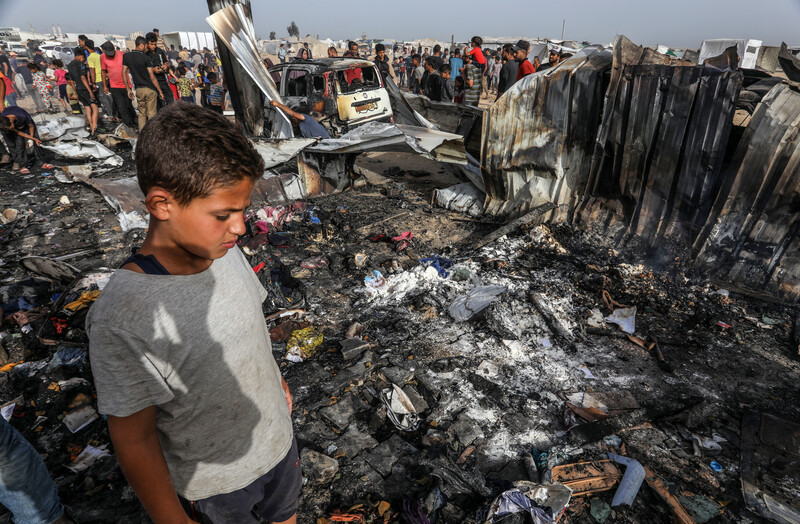Rights and Accountability 27 May 2024

A Palestinian child observes the damage after an Israeli strike on tents housing displaced people resulted in dozens of deaths and injuries in Rafah, southern Gaza, 27 May.
DPAAn Israeli aerial attack on the Tal al-Sultan neighborhood of Rafah, southern Gaza, set off a fire that ripped through a tent camp for displaced people, killing at least 45 Palestinians late Sunday.
The deadly attack came less than three days after the International Court of Justice demanded an immediate halt to Israel’s military offensive in Rafah “which may inflict on the Palestinian group in Gaza conditions of life that could bring about its physical destruction in whole or in part.”
Horrific images from the Rafah massacre prompted widespread scorn from world leaders and global organizations.
Video and photographs that emerged from the Rafah massacre are “some of the worst we have seen in the past seven and [a] half months,” stated Al Mezan, a human rights group based in Gaza.
Those images include Palestinians desperately attempting to recover charred bodies from the still raging fire and a man holding up the limp body of a headless baby as sirens and survivors wail around him.
“Gaza is hell on earth. Images from last night are yet another testament to that,” stated UNRWA, the UN agency for Palestine refugees.
While observers around the world reeled in horror from the media streamed out of Rafah, some prominent Israelis, including journalists, found the images befitting of the Lag BaOmer holiday, during which Jewish worshippers traditionally light bonfires.Balakrishnan Rajagopal, the UN special rapporteur on the right to housing, said that “attacking women and children while they cower in their shelters in Rafah is a monstrous atrocity.”
Rajagopal called for “concerted global action to stop Israel’s actions now.”
“Breaking point”
More than half of those killed in the Rafah massacre were women, children and older people, according to health authorities in Gaza.
At least 66 people had been killed and 383 injured in Israeli attacks across Gaza in the past 24 hours, the health ministry in the territory said on Monday.
More than 36,000 people have been killed in Gaza since 7 October, and more than 81,000 injured, though the actual number of fatalities is likely much higher, with thousands of people missing under the rubble of destroyed buildings.
The death toll from Sunday’s Rafah massacre was expected to rise due to severe burns and the lack of adequate medical facilities to treat the injured. Israel has systematically destroyed the healthcare system and targeted medical personnel in Gaza, severely hindering access to urgently needed medical care.
Israel has halted the movement of people in and out of Gaza after seizing control of Rafah crossing on the border with Egypt earlier this month, preventing patients from being evacuated for treatment.
The movement of humanitarian aid into Gaza has also been largely choked off as Israel expands its military offensive in Rafah, which has served as the hub of humanitarian operations in the territory for the last several months.
Martin Griffiths, the UN relief chief, said on Friday that “there has been nothing limited about the suffering and misery that Israel’s military operation in Rafah has brought to the people of Gaza.”
Griffiths added that “[it] has cut off the flow of aid into southern Gaza and crippled a humanitarian operation already stretched beyond its breaking point.”
The World Food Program warned on Monday that “if food and humanitarian supplies do not begin to enter Gaza in massive quantities, desperation and hunger will spread.”
Also on Monday, two medical workers were reported killed after Israeli forces targeted health teams at the Kuwaiti hospital in Gaza City, the health ministry said.
The Nasser Medical Complex made an urgent appeal for blood donations last week as hospitals are operating “amid dire shortages of fuel and medical supplies,” according to the UN Office for the Coordination of Humanitarian Affairs.
“Very grave”
Israel claimed that it had targeted two Hamas commanders with “precise ammunition and on the basis of precise intelligence” in the strike that set off the deadly blaze in Rafah on Sunday night.
The Israeli military’s lead prosecutor said that it would investigate the “very grave” incident.
Karim Khan, the chief prosecutor of the International Criminal Court, implied that Israel’s self-investigations were a “sham” in his announcement on Monday that he is seeking arrest warrants for Prime Minister Benjamin Netanyahu and defense minister Yoav Gallant and three Hamas leaders.
Mourning survivors of the Rafah carnage said that Israel had lied when it ordered people in eastern areas of Rafah to evacuate to the west, only to be killed in crowded tents.
“The army is a liar. There is no security in Gaza. There is no security, not for a child, an elderly man, or a woman. Here he [my brother] is with his wife, they were martyred,” Abed Mohammed Al-Attar told the Reuters news agency.
Before the deadly Israeli strike, Palestinian fighters fired rockets from southern Gaza towards Tel Aviv, causing no casualties but demonstrating that the resistance still has the capacity to disrupt business as usual in the center of commerce in Israel.Also on Sunday, Abu Obeida, the spokesperson for the Qassam Brigades, the armed wing of Hamas, announced that the group’s fighters had captured Israeli soldiers in an ambush in Jabaliya, northern Gaza, the previous day.
The Qassam Brigades released a short video clip that appears to show a bloody soldier’s body being dragged through a tunnel and weapons and equipment seized from Israeli troops.
Israel denied that any of its soldiers were captured in Jabaliya and admitted that one of its troops was seriously injured during battle in the area on Sunday night.
On Monday, an Egyptian border guard was killed in an apparent exchange of fire between Israeli and Egyptian soldiers near the shuttered Rafah crossing.





